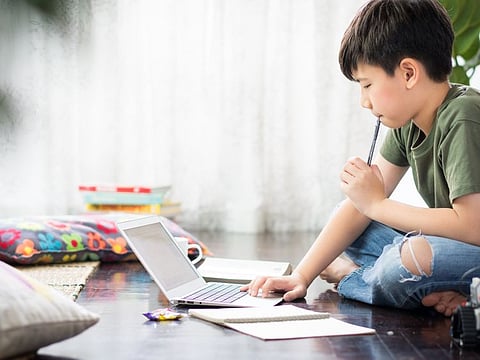UAE School Reopening: Remote learning puts kids under 'Toxic Stress'
Medics say parents should opt for in-person learning this term or face worse health issues

"I just want to play with my friends!" an 8-year-old patient said, bursting into tears. This was during a recent video visit one of us had with the patient and his mother, a single parent. It's just the two of them in a cramped apartment with no garden and no safe park to play in nearby. The mother is working from home, so poor Julian has to entertain himself quietly and alone. It has been a lot of video games and TV for the past few weeks.
The video visit was a quarterly follow-up for weight management - and it has not been going well. Julian has been sedentary during the pandemic, and it wasn't clear how to encourage him to be more mobile. Maybe he could play "Dance Dance Revolution" on the Wii? Julian nodded reluctantly. How many times a week did he think he could do that? "Maybe twice?" he said.
What is happening to this 8-year-old? To his family? To all the children who have been out of school for months? The answers to these questions are complex and may linger for the entire lives of our young population, but the effect does have a name: toxic stress. This concept is relatively new to the health field, but it is as bad as it sounds.
Toxic Stress V COVID-19: Which is the bigger threat to kids?
Toxic stress is repeated and persistent activation of the body's fight-or-flight response. Researchers in China have already demonstrated children there were affected by it during the initial stages of fighting the pandemic. Now our children face the same risks.
Children and their caretakers aren't coping well with this, as indicated by increased use of mental health resources since the pandemic started. In our clinic, talking with nearly any parent who's balancing work from home and child care, it is apparent that sitting inside in front of a screen has become the new playing outdoors. The absence from consistent school has probably led to 1 out of every 3 elementary students losing skills in reading and writing. Their worlds have been turned upside down at a time when their brain is growing and changing faster than the speed of sound. All because of toxic stress.
nullAlice Kuo and Casey Nagel
The disruption of virtual school is increasing the risk this generation of children will suffer from and die of heart disease and diabetes. It could reduce their lifelong earning potential and cripple their mental health. Forming healthy social and physical habits and promoting a love of learning are vital processes for school-age children that are integrally associated with lower chronic disease burden, higher economic earnings and increased overall life satisfaction, and every day out of school is taking these things away from the children in our society.
Why children need in-person school this autumn
All of this is why pediatricians are concerned about the possibility of a lack of in-person education this autumn. Covid-19 is also clearly costing too much for our parents and children. We need to critically examine the safest way to get children back into school to stop this harm.
While SARS-CoV-2 is a novel virus and we have much to learn about it, the research emerging about this infection in children suggests if they get sick, their illness is typically milder, and children do not spread the virus as much as adults, especially below the age of 12. Many countries in Europe and Asia have either reopened or successfully kept elementary schools open with minimal school outbreaks, thanks to an overall lower infection rate in their communities. Therefore, the priority is to keep teachers and staff as well as children safe in the school environment and beyond. We know how to do that with a combination of masks when appropriate, physical distancing, diligent handwashing and cleaning, and adequate ventilation.
We can't wait for a vaccine - there are so many uncertainties about how long it will take to create one, how effective the early attempts will be, and how many people will elect to get immunized that keeping children out of school until then is unrealistic.
As our nation struggles to survive this pandemic, we must consider the impact of keeping children home this autumn to endure more isolated distance learning. We are putting an entire generation of children at risk for a lifetime of worse health outcomes. Anyone who has used the health-care system knows decisions are made while considering risks vs. benefits, and pediatricians across the country would never actively hurt or kill a child. It's time to safely and cautiously get students back into school. Their future health is at stake.
Kuo is professor of child health policy, chief of medicine-pediatrics and director of the UCLA Center of Excellence in Maternal and Child Health. Nagel is an internist and preventive and public health physician who is focused on helping people of all ages live their healthiest life.
Sign up for the Daily Briefing
Get the latest news and updates straight to your inbox








